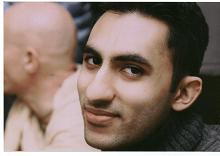Despite the Saudi monarch's noble intentions to bring members of different faiths together, it seems that he may fallen prey to a common misconception, rooted in ignorance or stereotype: that only Judaism, Christianity, and Islam are "the monotheistic religions." The article says that the "Saudi king has made an impassioned plea for dialogue among Muslims, Christians and Jews" and quotes Abdullah as saying:
"The idea is to ask representatives of all monotheistic religions to sit together with their brothers in faith and sincerity to all religions as we all believe in the same God."
It is true that Judaism, Christianity, and Islam share common roots in Abraham, and it is true that they have been traditionally associated with a fierce (and sometimes violent) defence of monotheism among polytheistic neighbors. But because they are monotheists does not mean that they are the monotheists. Followers of the Vaisnava tradition (including ISKCON members) are staunchly monotheistic.
Of course, we can't really blame King Abdullah; even among the media, scholars, and interfaith advocates -- folks who ought to know better --the old "the three monotheistic faiths" line rears its ugly head from time to time.
So what can Eastern monotheists do to set the record straight?
Well for one thing, we need to gently (but firmly) educate those who may be unaware of monotheism east of Palestine. That means working proactively with other faith groups and writing in non-abrasive letters correcting reporters who got it wrong (and appreciating those who got it right).
For another, we must recognize that definitions are not set in stone and that perceptions can be changed. To do that, devotees of ISKCON (and other specific denominational Vaisnava institutions) may need to broaden their scope and re-connect with their identity as Hindu
representatives.
Some devotees cringe at the use of the term, offering standard "Srila Prabhupada said we are not Hindus" reasoning to justify their stance. (See this presentation by Gauri Dasa for a more balanced view of Prabhupada's feelings on identifying and not identifying with Hinduism).
Scholars already agree that Vaisnavism is numerically the largest denomination within Hinduism. The fact of the matter is, if Vaisnavas want to help to shape how "Hinduism" is defined and understood (and not misunderstood), we have to be willing to reclaim our Hindu identity. If we want to be players on the world stage, those are the rules of the game that we need to accept.



5 comments:
Very well said. Vaishnavas need to claim the Hindu identity, as the impersonalists constantly try to claim that their tradition is Hindu and the Hare Krishna's are not Hindu and they keep misquoting Srila Prabhupada on it and tell others not to support ISKCON and create doubt in minds as if somehow ISKCON or the sankirtan movement is not bona fide and is a cult.
Hare Krishna
Nice article by Vineet Chander prabhu. Though i have not seen the presentation by Gauri Das, i do think the comments by Srila Prabhupada has to be seen in full context during the time he said it.
My comment to this blog, however, is while we try to educate the world of this knowledge gap, from my experience, i think, the one billion people in India do not have a clue of who is God. This is the fundamental problem. I seriously doubt if a common Indian thinks there is one Supreme God in Hinduism or in other words, "Hinduism" is indeed monotheistic.
From the world perspective, if majority of Indians who are mostly Hindus do not have this monotheistic perspective, i doubt the world will take us seriously.
I think we should target and re-educate the lost values of our culture to our own people.
My 2 cents...!
Hare Krishna
anand
good writing prabhu hari hari
bharatiya samskritiis henotheistic
bharatiya samskritiis henotheistic
Post a Comment